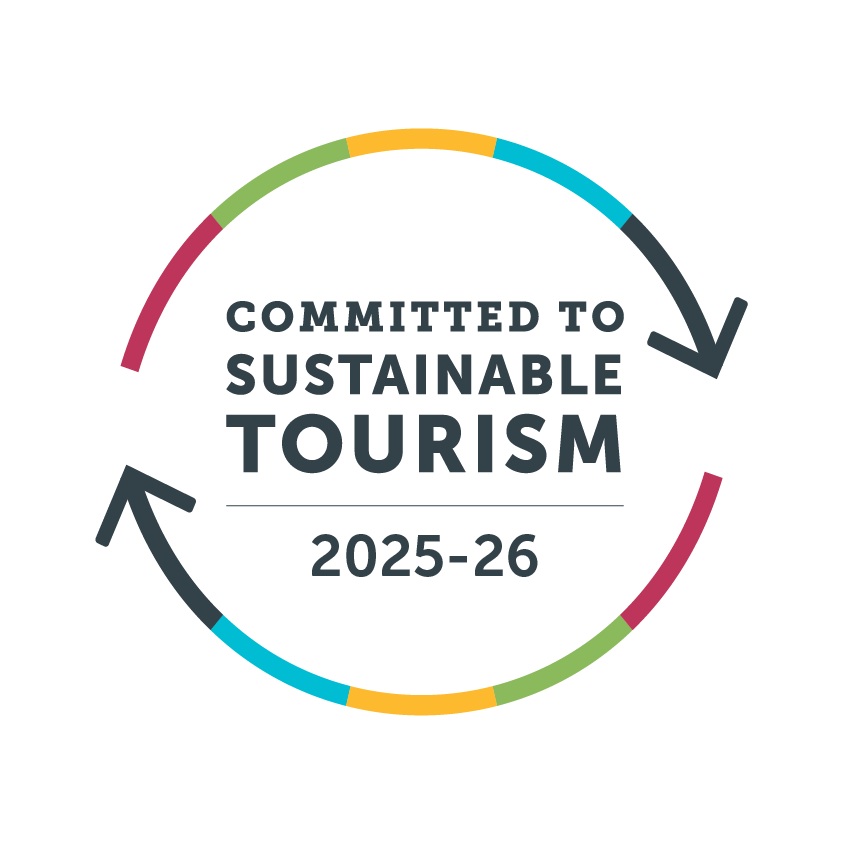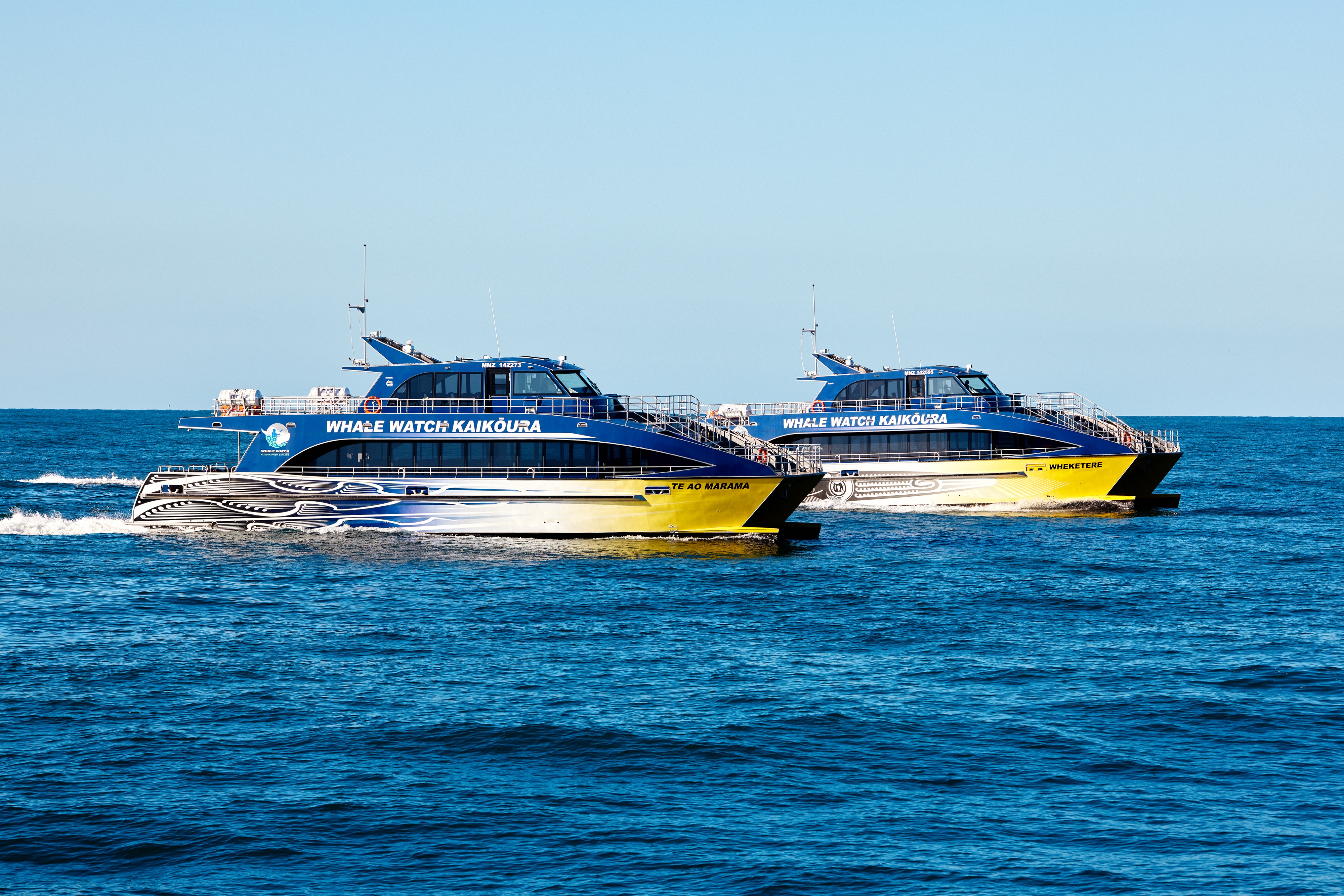Kaitiakitanga / Conservation
Whale Watch is committed to providing a quality whale watching experience while carefully managing the use of a rare natural resource. We are visitors to the world of the whales and respect it as such at all times.
Sustainable Tourism
As a Māori-owned company, Whale Watch cherishes the twin values of hospitality (Manakitanga) to visitors and reverence (whakaute) for the natural world. It is a philosophy that embraces people, the land, the sea and all living things as one (Ki Uta Ki Tai) from the mountains to sea and everything in between). Perhaps this is why so many of our visitors tell us our tours provide them with a spiritual experience.
Ngāi Tahu have formed a sustainable relationship with Kaikōura's entire ecosystem including the marine ecosystem that maintains the whales in their natural environment. Nothing within that sustainable philosophy will allow Ngāi Tahu to harm this ecosystem that keeps the whales close to Kaikōura. For dozens of generations over many centuries this view of life has been fundamental to our ancestors. There must always be enough - more than enough - to sustain life in its entire spiritual and physical sense.
Mō tātou, ā, mō kā uri ā muri ake nei – ‘’for us and our children after us’’
Thus for Ngāi Tahu and Whale Watch, the word 'sustainable' has both a physical and spiritual meaning. It goes to the heart and soul of being Māori. It is a core principle of the whale watching experience we share with our visitors. Ngāi Tahu have lived with whales for over 1000 years. We intend to live with them for another 1000 years.
All Whale Watch vessels are specially designed for whale watching. Our modern catamarans are powered by inboard diesel engines and equipped with Hamilton propulsion units that minimise underwater noise. All on-board toilets are self-contained and never allowed to pollute the sea. Detailed records are kept for each trip, covering personalised identification of every whale seen, its location and any unusual whale behaviour. This information is part of the on-going contribution to scientific research by Whale Watch. Some Sperm Whales that visit Kaikōura regularly appear to recognise and trust the Whale Watch boats and do not mind being approached. New whales, though, prefer the boats to keep further away. Whale Watch skippers recognise individual whales and adjust operations to suit each whale.
Whale Watch is proud of their many awards that recognise their commitment to the preservation of the environment. Former Whale Watch Chairman Wally Stone says,
"Whale Watch isn't about to do anything which will adversely affect the whales that provide year-round income - or drive them from the coast. We have the most to lose, so we won't be doing anything to jeopardise the whales in our waters."
Whale Watch is a staunch ally of the marine conservation movement. Wally Stone points to the support Whale Watch gives to the ongoing international fight to protect whales from a renewal of commercial killing and the resumption of trade in whale products. Japan and Norway continue to vigorously lobby members of the International Whaling Commission to re-introduce commercial whaling. Both nations still take hundreds of whales each year for "scientific purposes" when in fact the whale meat ends up in fish markets. Wally Stone says the Whale Watch '"experience" sends a powerful message to those who wish to slaughter whales.
"We see our business as reinforcing the anti-industrial whaling message. This in turn reinforces whale preservation, the Southern Oceans Whale Sanctuary and the whale protection stances adopted by many members of the International Whaling Commission."
It remains a sad fact that the very same whales seen aboard Whale Watch tours may be killed by commercial whalers once outside New Zealand waters.
“It can be heard in the song of the bird,
It can be felt in the breath of each new day,
It lives in the spirit of Mother Earth.
It lives in our hearts, and it will be witnessed.
Through the eyes of our children”
Our Philosophy
We seek to:
- Minimize Waste and Recycle,
- Use eco-friendly products.
- Measure and reduce our energy consumption and carbon footprint.
- Minimize our impact on the marine life.
Education is an important aspect of the experience we deliver and something we have spent a lot of time developing and continually look to improve.
Our aim is for customers to go away knowing that they have learnt something new and interesting, and in the process becoming advocates for the protection of our natural marine environment.
We work hard to support our environment by undertaking a number of actions. Many of these you will not see, but some you may notice.
Some examples of actions that you may not see include:
- Using jet propulsion units on all our vessels to minimize noise and prevent mammal strikes with exposed propellers.
- Storing all rubbish and wastewater on vessels for discharge appropriately on land.
- Making land available to the Dept of Conservation for the endangered Hutton's Shearwater translocation programme.
- Providing sponsorship to our local schools, community groups and sports clubs.
- Supporting and contributing financially to research conducted in the Kaikōura area on Whales, Dolphins and Seals.
Sustainable Whale Watching in Kaikōura
Whale watching in Kaikōura has had decades of scientific research conducted on it in relation to the potential impacts of commercial Whale watching on Sperm Whales, all interactions with marine mammals are strictly governed by the New Zealand Marine Mammal Protection Regulations.
Targeted research completed in 2011 concluded:
The current regulations administered by the Department of Conservation including existing limits on permitted tours and the three vessels within 300m rule appear to appropriately manage the level of interaction between tour vessels and whales. Such regulations minimize effects of the vessels on sperm whales, promoting a sustainable whale watching industry at Kaikōura. Looking forward, it would appear that whale watching tourism at Kaikōura is on the right track, with growth and development that is good for the community and does not appear to impact the animals. For example, the newer, larger vessels operated by whale watch can carry more passengers and make less noise. While marine mammal eco-tourism will no doubt continue to expand at Kaikōura, we suggest that continued caution is warranted with respect to the rate of growth and the sort of growth to ensure both a healthy tourism business and a healthy sperm whale population for generations to come.

Tourism Sustainability Commitment
The Tourism Sustainability Commitment is a programme to enable individual tourism businesses to contribute to our Vision. The programme is managed by New Zealand's tourism industry association, Tourism Industry Aotearoa (TIA). It was developed by industry for industry.
The requirements of the TSC
- Have a sustainability plan with goals for all twelve Commitments
- Make measurable progress towards these goals
- Embed sustainability into business systems, processes and plans
- Provide an annual return with an update on progress (by responding to a TIA survey)
- Communicate with communities and visitors about sustainability efforts



